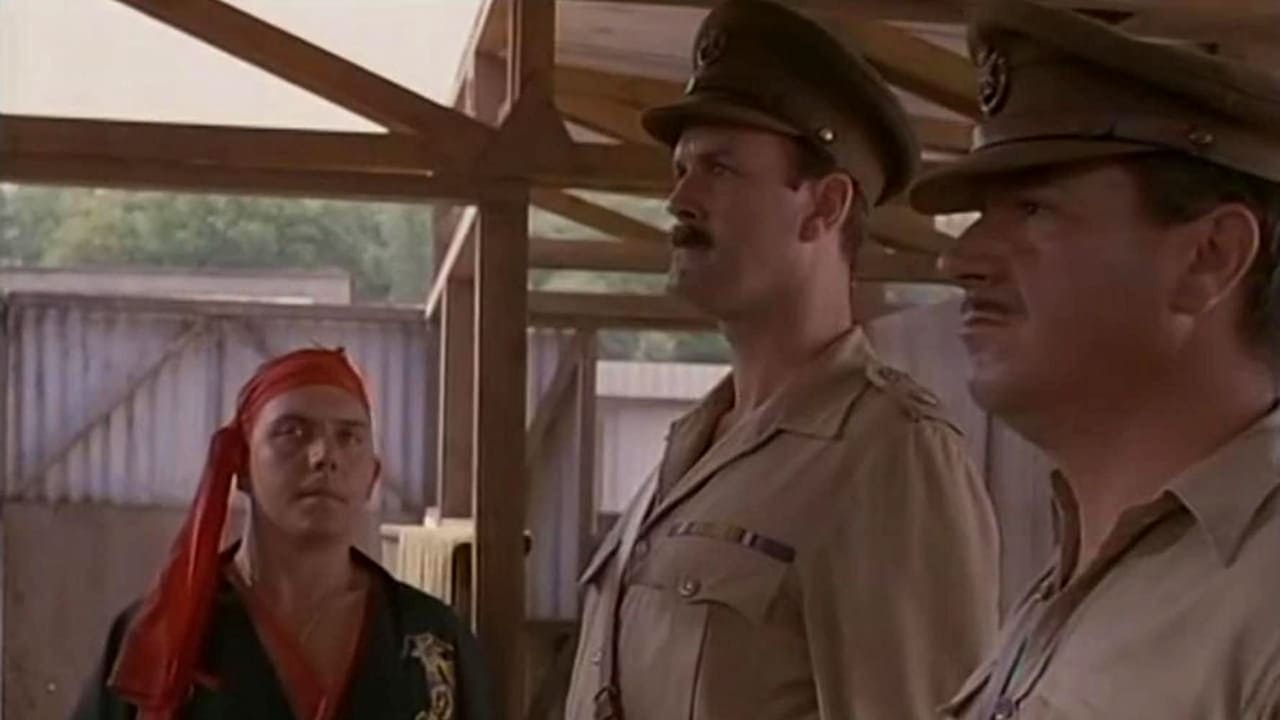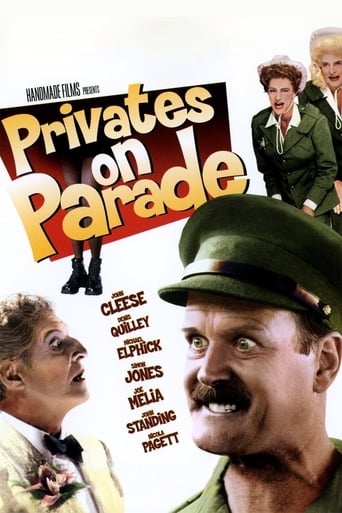

One the one hand, this is a peculiar blend of farce, satire, anti- establishment jokes, musical high-jinks, exaggerated character studies and ridiculously camp impersonations, with – on the other hand – romance, tragedy, realism, death and mutilation. Nevertheless, the sexual innuendo rippling through every second phrase to the point of monotony certainly gives a pointer to the overall movie's intended audiences. It would certainly take a genius to form a cohesive film from such disparate elements, but director Michael Blakemore certainly gives it a good college try. His devices include on-location filming, incorporating old newsreel footage, fading in from black-and-white to color and vice versa, and using dissolves, split screen and other mechanical devices. But it doesn't work – basically because the players won't let it work! Just about everyone in the cast has a Victor McLaglen complex and tries to out- act, out-play and out camera-hog everyone else! Worst offender is prolific TV actor Denis Quilley who made only nine or ten films, but John Cleese gives him a good run for his money. Oddly, both Quilley and Cleese are effective at times, showing how the film could have been improved if they had toned their acting down a bit.Another problem is that the musical pastiches are supposed be second-rate, and this is how they are actually played – with enthusiasm, but also with a degree of amateurishness which is sometimes endearing (e.g. the Fred Astaire-Ginger Rogers pastiche; the Flanagan and Allan skit), sometimes just amateurish (particularly the skits performed by Denis Quilley). The Carmen Miranda and Marlene Dietrich take-offs are particularly inept.Technical credits are highly competent but the film is less effective than the sum of its parts. The finale in which everything is left up in the air is particularly unsatisfactory. Maybe this would work okay on the stage where the disparate elements could be separated by the rise and fall of the curtain. Unfortunately, neither the screenwriter nor the director have been able to come up with a similar solution to the movie.
... View MoreReally, the film is as confused as some would argue the cross-dressing military units are. I'm not a fan of John Cleese. That's hardly a secret. I tolerate him on Monty Python, and I will grant that he can entertain, but as a general rule, I don't exactly make it a point to seek out his work(though I do not make as strong efforts as I could to avoid it, either... I reserve that for those that I genuinely cannot stand). This film was purchased for me by someone mistaking it for something having to do with his comedy troupe(with good cause, as its crude pun title was translated to "Python at the Front Lines"). A rather see-through attempt at passing it off as something it's not, really, as he's not joined by even a single other member of the group. One of the main problems is that this cannot seem to make up its mind on what to be; a comedy or a war-drama. Neither of them are achieved particularly effectively, separate from each other, and whenever the two are attempted at the same time, it's even worse. There are times when the war aspect seems tacked on, as if the writers were busy writing the attempts at comedy, and suddenly remember that it's set during war-time. The drama begot little emotional response from me(albeit I will admit that it did manage some, near the very end). The comedy... I don't know, it seemed to mainly consist of the flamboyantly gay character being, well, flamboyantly gay, and shining a spotlight on the fact that the men, soldiers, no less... wait for it... are wearing *dresses*. Yup. That's about it. I guess the musical numbers weren't bad. Cleese does nothing to amuse, playing it more straight than many of us were aware he was capable of. He plays someone who, at least appears to be(it's not really clear) deeply religious, and I couldn't tell if this trait was supposed to be part of the comedy or the drama aspect of the film. I don't know, if you're into musicals and/or men in drag, you may like it. I recommend this to people in either or both of the aforementioned groups(I won't stoop to the level of suggesting that those who enjoy one are highly likely to also enjoy the other), but I'm not sure who else to steer towards this. Don't watch this thinking that Cleese does what you're used to(those goofy-looking poses that you see on the cover of the home release... they're from *one* bit in the film, during the credits, which is really the only time he's Python-y). 5/10
... View MoreLike "M*A*S*H" and "Good Morning, Vietnam", "Privates on Parade" shows soldiers making the best of their wartime service. In this case, a gay British platoon in 1940s Malaya messes with the rules while under orders to fight Communist insurgents. John Cleese plays their very heterosexual, very militaristic commander. In some ways, the whole movie seems like an excuse for a series of flamboyant skits, but you shouldn't find them boring. As it is a war movie, there are of course some rather disturbing scenes of battles, but the zany skits overshadow that. If only wars involved more of this! Oh, and since this is a John Cleese movie, prudish people (or anyone who does not wish to hear Jesus' name used "in vain") should avoid this movie at all costs.
... View MoreA bad film. It can't seem to decide whether it wants to be a goofy comedy about flamboyantly gay showtune performers or a tragic and realistic war movie. Any attempts on its part to be both at the same time are unsuccessful, in my opinion.Big fans of John Cleese might be tempted to watch this movie thinking that Cleese is enjoyable to watch whatever he's in, but he really has nothing to work with in this material. He plays it very straight (in more ways than one) and the filmmakers don't even manage to squeak much humor out of this contrast with the other members of the performing troupe.Skip this film.
... View More